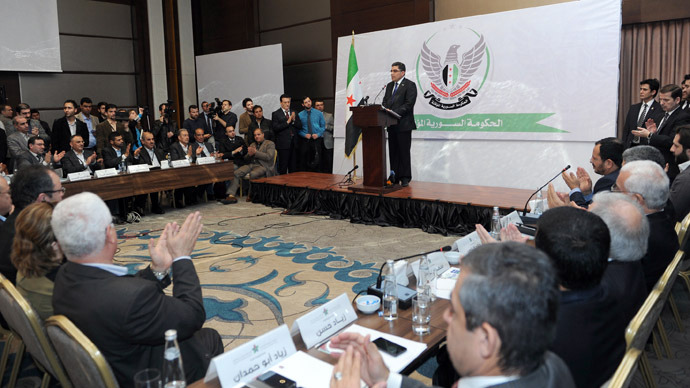‘Coalition set up one-colored, extremist government’ - Syrian opposition activist

Several people suspended their membership in the Syrian National Coalition a day after it named an Islamist-backed candidate as provisional prime minister. One leading Syrian opposition member told RT why he chose to withdraw from the Coalition.
“With all the feelings of hostility towards the Assad regime,
I think we shouldn’t go [too] far eliminating our public entity and
ruining our homeland. The coalition has already gone far setting up
a ‘one-colored’ government, which we can characterize as extremist.
The reason is that the mechanisms used when choosing the head of
the government were wrong and undemocratic. This coalition wasn’t
chosen, it was appointed. Its clear majority has a predominant
religious character. This doesn’t match the reality of the Syrian
society,” Kamal al-Labwani told RT.
The Syrian National Coalition was formed in 2012 in Doha to build
an alternative government structure to replace the Assad regime.
The body replaced Syrian National Council which had been criticized
for being ineffective. The group members found themselves torn
apart by conflict when the Coalition’s liberal minority accused the
Muslim Brotherhood and its allies, who include a handful of
Christians, of assuming control of the coalition, Reuters
reported.
“[The] Muslim Brotherhood controls 40 votes in the coalition, so
in the long run they win any voting. Such [a] government would be
‘one-colored’ serving the interests of those who appointed it. That
is why we don’t believe in patriotism of this government and
independence of its decisions. We won’t give it legitimacy, no
matter how hard it’s fighting against Assad. We won’t give it
legitimacy because of its actual failure,” Kamal al-Labwani
said.
Earlier this week the Syrian opposition coalition has elected a
Western-educated US citizen to oversee a provisional government for
Syria's rebel-held areas. Viewed as a ‘consensus candidate’ among
Syria’s liberal and Islamist factions, former businessman Ghassan
Hitto received 35 votes out of 49 ballots cast during the Syrian
National Coalition meeting.
Kamal al-Labwani told RT that if the “coalition was born as a
result of honest and free elections, we would have accepted the
results of any voting. But in this appointed coalition, there’s no
decision making other than by means of consensus. Syrian ethnic
minorities mustn’t be denied the right to take part, Syrian liberal
political forces shouldn’t be either,” the activist
explained.
According to Labwani, a “legitimate authority must represent the
opinions and interests of all Syrian people.”
“We are looking for a political settlement of the crisis, and
the beginning of this settlement has to be Assad’s departure; he is
the main problem. We will never be able to reach ceasefire and
political settlement if the Assad regime is still there. It’s all
needed to preserve the state and its multi-ethnic composure [sic].
If we insist on Assad’s presence, we would only make problems
multiply, with each party’s radicalism growing further,” he
added.
According to varying estimates, the conflict that has been
unfolding in Syria since March 2011 has already claimed between
28,000 and 40,000 lives.
The statements, views and opinions expressed in this column are solely those of the author and do not necessarily represent those of RT.












